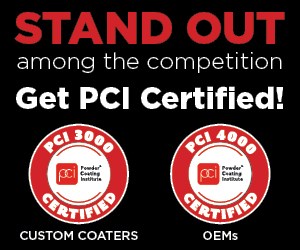Compounds Are Key to Mass Finishing Success
These chemical additives can help degrease, brighten, polish, protect against corrosion and provide stain resistance, and they keep the entire finishing process clean by continuously flushing out contaminants.
Q. We are having some issues with our mechanical finishing operations and think we may not be using the proper compound for the parts. What advice do you have for choosing the right compound?
A. Machinery and media are nothing in the mass finishing world without the right compound. A manufactured object can be designed to specifications, but if it doesn’t look and feel finished, it may be rejected. A metal alloy can be structurally perfect, but surface corrosion may make it less presentable. Process water may work well for initial cycles before contaminants wear down its effectiveness over time.
Also known as chemical additives, compounds are an essential element of a mass finishing process and the key to maintaining a stable, high-quality mass finishing operation. Having the right compound for a given mass finishing process can solve each of the problems list above and more.
Compounds can help degrease, brighten, polish, protect against corrosion and provide stain resistance. One of their key functions, however, is keeping the process clean by continuously flushing contaminants such as tiny metal fines from the workpiece or minute media fines out of the mass finishing system.
As indispensable tools for recycling process water and ensuring an eco-friendly finishing operation, compound selection can make or break a mass finishing process. Four common types of compounds to consider are liquid compounds, recirculation compounds, grinding pastes and polishing pastes.
Liquid compounds are the foundation of the modern surface finishing process. Thanks to their ability to remove contaminants such as metal and/or media fines from the process, they keep the components and the media clean while ensuring a repeatable, high-quality mass finishing process.
Recirculation compounds are formulated to provide a consistent process quality for every application and to ensure long service intervals for process water, thus reducing downtime and maintenance costs. These compounds are best for use in closed-loop water recycling systems, but they can also be used in flow-through processes.
Grinding pastes are suitable for treating almost any metal or metal alloy. These compounds serve as a buffer between parts to prevent part-on-part impingement and are available in wet and powder form. Dry pastes offer the advantage of easy dosing and can be used with process-water recycling systems, while wet pastes can produce a smoother finish.
Polishing pastes produce smooth, high-gloss finishes on a wide variety of parts ranging from turbine blades to cutlery and surgical instruments. Much like grinding pastes, dry polishing pastes are easy to dose and can be used with process-water recycling systems. Wet pastes produce extremely low surface roughness (Ra) values.
Marty Moga is the process lab manager for Rosler Metal Finishing. Visit rosler.com.
Related Content
-
Robot-Ready Grinding Systems for High-Speed Production
Advanced rotary surface grinders now come “robot-ready” to facilitate integration with third party robotic arms and fully automate the process from loading to unloading.
-
Vulkan Blast Shot Technology
Vulkan Blast Shot Technology is a pioneer in the stainless steel abrasives market.
-
Modernizing Wastewater Treatment and Recovery
Source: Kontek Kontek’s “spigot to drain” Source Water and Wastewater Solutions offer integrated technologies to modernize your water & wastewater treatment and recovery.















